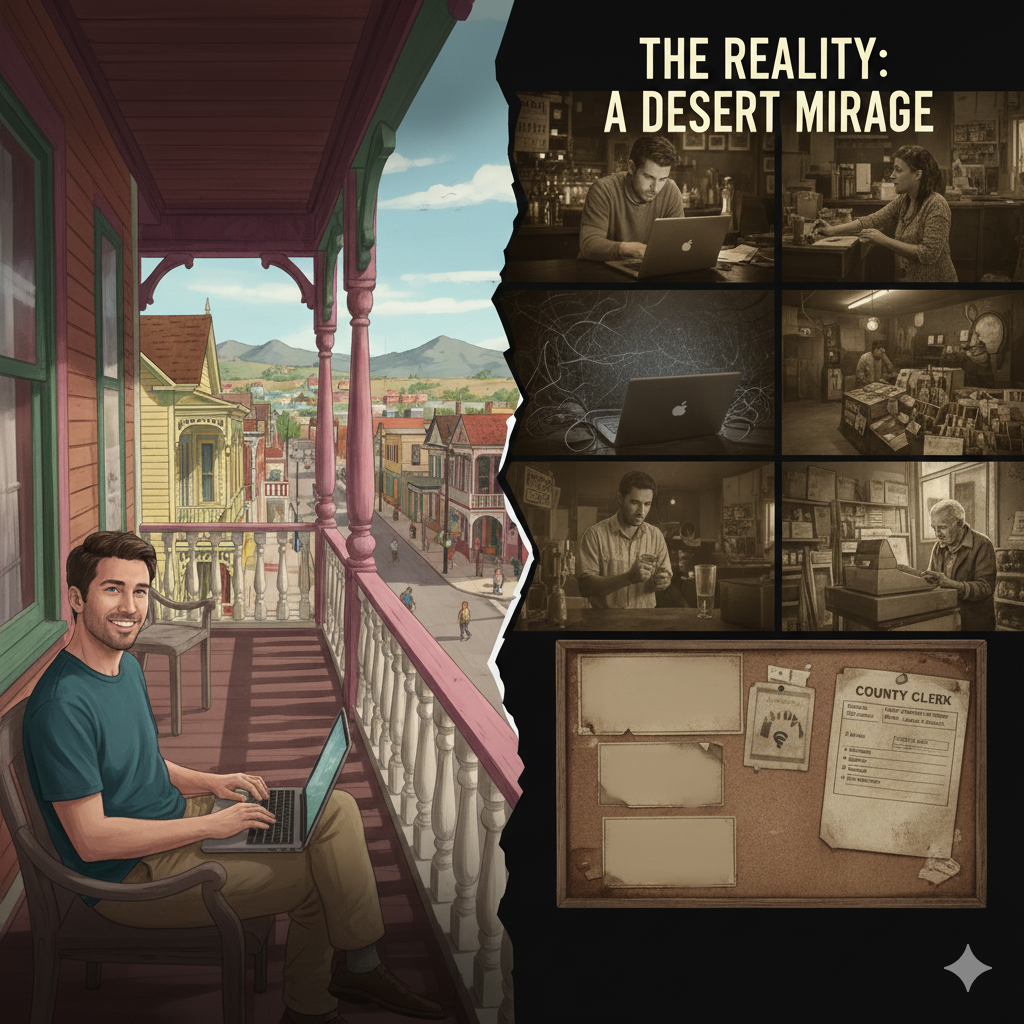Last updated on October 29, 2025
The most pervasive and dangerous myth about relocating to a place like Bisbee is the idea that you can simply “bring your own job.” In the golden age of remote work, this seems plausible. You picture yourself tapping away at your laptop on a picturesque balcony, the high desert sun warming your face, your big-city salary funding a charming, low-cost lifestyle. This fantasy is the lifeblood of Bisbee’s appeal to outsiders, and it is a complete and utter fabrication. The first thing you will learn is that the infrastructure required for consistent remote work—reliable, high-speed internet—is a rare and precious commodity here, a topic we will dissect in excruciating detail later.
But let’s say you are one of the lucky few who secures a home with a stable connection, or perhaps your work isn’t online. What then? The reality of the local job market is a barren wasteland. There are essentially four pillars of employment in Bisbee: tourism, government, the service industry that caters to the first two, and healthcare for a largely aging population. None of these offer robust opportunities for career growth, competitive wages, or long-term financial security. The dream of finding meaningful, skilled work locally is just that: a dream.
The jobs that are available are almost universally low-wage and part-time. You can pour drinks for the weekend tourists, sell them turquoise jewelry, or perhaps guide them on a ghost tour through the dark, narrow streets. You might find work as a cashier at the town’s only major grocery store or change sheets at one of the many “historic” hotels. These are not careers; they are gigs. They offer no benefits, no retirement plans, and no path to advancement. It’s a hand-to-mouth existence, perpetually at the mercy of the seasonal tourist ebb and flow.
For those seeking more stable, professional employment, the options are stark. The largest employers are the city and the county. These government jobs are highly coveted, not because they are particularly fulfilling or well-paid, but because they are the only source of steady paychecks and benefits in a 25-mile radius. Competition is fierce, and positions are few and far between. Unless you have a specific, in-demand civil service skill set, your chances of landing one of these roles are slim to none. You are more likely to spend months, if not years, cycling through fruitless applications.
The artist’s life, the supposed backbone of the town’s identity, is even more precarious. While there is a genuine community of talented artists, they are not thriving; they are surviving. They are competing with each other for the limited disposable income of tourists who are more interested in a cheap souvenir than a serious piece of art. The galleries are often vanity projects or co-ops where the artists themselves have to pay rent and staff the counter. The notion of moving to Bisbee to “make it” as an artist is a cruel joke, a fast track to poverty subsidized by a side hustle serving coffee to the very people you hope will one day buy your work.
Furthermore, the lack of economic diversity creates a stagnant, insular professional environment. There is no industry, no tech sector, no corporate presence. This absence of a dynamic economic engine means there is no influx of new ideas, new people, or new money, aside from the tourist dollars that are spent and then disappear. The town is economically adrift, floating on a sea of nostalgia and sustained only by the pension checks of its retirees and the weekend spending of visitors from Phoenix and Tucson.
This economic stagnation has a profound effect on the town’s psyche. There is a palpable sense of resignation, a quiet desperation that hangs in the air. Ambition is a foreign concept. The goal is not to get ahead, but simply to get by. Young people who grow up here have no choice but to leave if they want any semblance of a career, contributing to a brain drain that further depletes the town’s potential.
The low cost of living, often touted as a major benefit, is a lie when contextualized by the abysmal earning potential. Yes, your property taxes might be lower than in a major metropolitan area, but your income will be a tiny fraction of what you could earn elsewhere. That “affordable” house becomes a money pit when you have no disposable income for the constant repairs it will inevitably need. The financial equation simply doesn’t work.
You cannot build a future here. You cannot establish a career, save for retirement, or provide opportunities for your children. You can only tread water, hoping the seasonal tide of tourism is strong enough to keep your head above the surface for one more month. The job market isn’t just a challenge; it’s a mirage in the desert. And the closer you get, the more painfully obvious it becomes that there is nothing there at all.
This fundamental lack of economic opportunity is the original sin from which all of Bisbee’s other problems flow. It is the root cause of the crumbling infrastructure, the social friction, and the quiet desperation that permeates the town. Before you are seduced by the aesthetics of the place, you must confront the brutal economic reality. There is no work here. And without work, there is no life.
